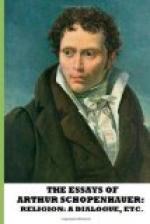Demopheles. Well, no harm is done, and it doesn’t make any real difference. As a fact, Protestantism is more suited to the North, Catholicism to the South.
Philalethes. So it seems. Still I take a higher standpoint, and keep in view a more important object, the progress, namely, of the knowledge of truth among mankind. And from this point of view, it is a terrible thing that, wherever a man is born, certain propositions are inculcated in him in earliest youth, and he is assured that he may never have any doubts about them, under penalty of thereby forfeiting eternal salvation; propositions, I mean, which affect the foundation of all our other knowledge and accordingly determine for ever, and, if they are false, distort for ever, the point of view from which our knowledge starts; and as, further, the corollaries of these propositions touch the entire system of our intellectual attainments at every point, the whole of human knowledge is thoroughly adulterated by them. Evidence of this is afforded by every literature; the most striking by that of the Middle Age, but in a too considerable degree by that of the fifteenth and sixteenth centuries. Look at even the first minds of all those epochs; how paralyzed they are by false fundamental positions like these; how, more especially, all insight into the true constitution and working of nature is, as it were, blocked up. During the whole of the Christian period Theism lies like a mountain on all intellectual, and chiefly on all philosophical efforts, and arrests or stunts all progress. For the scientific men of these ages God, devil, angels, demons hid the whole of nature;




